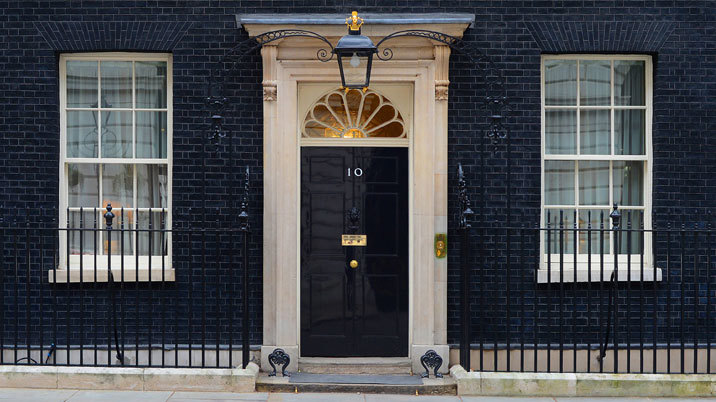
Election fever
And they’re off! One week down, five to go. There’s little journalists like better than an election campaign, but what do they bring to the party? In the past, they were the essential conduit, the means for politicians to get their message across. But that is far from the case now, with all the key players making their own videos and posting them on social media, sometimes to precisely targeted audiences, leaving the rest of the world in ignorance of what they’re up to.
This unfiltered link between candidate and voter makes the role of the journalist more, not less, essential. With politicians drifting ever further from the truth and ever closer to fantasy, there has never been a greater need for dispassionate reporting, for assiduous fact checking, for context, for rigorous questioning.
Journalists should be travelling round the country independently, not just on the battle buses or hitching a ride on Rishi’s helicopter, and they should be talking to voters as well as to politicians and spads, not simply quoting opinion polls. Not for cheap and pointless vox-pop “the voters have their say” features that give voice to six people apparently picked at random, but whose views are in fact chosen from dozens to reflect the desired balance of opinion. But for background, for real insight.
They should be going into hospitals, care homes, village halls, schools, nurseries and playgroups (where allowed), looking at the state of the high streets, talking to café owners and retailers, counting the charity shops and the wine bars against the hardware stores and delis. They should be poking around on those little enterprise / mini industrial estates, and generally getting a proper feel of how various parts of the country are (or are not) functioning.
The fight for airtime
In fact, they should have been doing this for the past however many years. But they haven’t. And they won’t. They will trail around after the party leaders. And Nigel Farage, who has no part in this election other than as a disrupter. Heaven only knows what the BBC was thinking, sending its political editor chasing after him in Dover on Tuesday, leaving the real politicians to less senior colleagues.
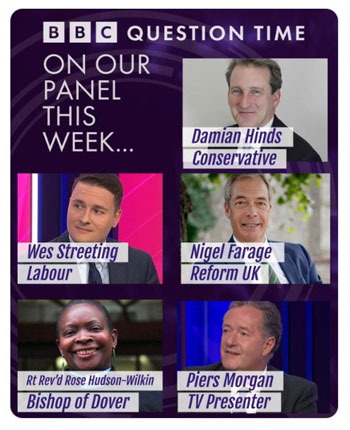
That night’s main news bulletin had Sunak, Starmer, Ed Davey falling off a paddleboard and Farage. Where were the Greens, the party that has made most progress over recent years, particularly in this month’s local elections? The BBC was clearly aware of the failing, since the newsreader said something like: “We’ll be looking at other parties in the coming days.” Last night, there were a few seconds for the SNP, but still no Greens. That isn’t good enough. The Greens rarely get a place on Question Time or Any Answers – usually having to take their chances against a businessman or journalist (usually from the right) for the final slot, while Richard Tice and Farage, whose party managed just two councillors – 840 fewer than the Greens – are everywhere. Blow me down, Farage is on again tonight.
Is this approach justified by the opinion polls, which show the Reform party support at 8% against 11% for the LibDems and just 3% for the Greens? Maybe, but if you don’t get the airtime, you can’t increase your support. And the argument doesn’t hold when you apply it to the big two parties. The latest Survation poll gives Labour a 23-point lead over the Conservatives, at 47% against 24%. Is anyone seriously suggesting they should get twice the coverage. Of course they shouldn’t. Or that the LibDems should get at least half as much coverage as the ruling party? Probably not, but maybe they should. There isn’t the airtime to give everyone an equal shout, so judgments have to be made about where and how to deploy resources.
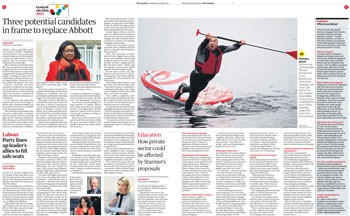
The same, of course, applies to newspapers, where the Conservatives and Labour hog most of the space, with everyone else – apart from Farage again – consigned to the fringes of pages. Unless, like Ed Davey, they fall off a paddleboard or get covered in egg and then there might be respite from the party leaders in the main picture slot. Inside. On Monday, Trevor Kavanagh had a rant about the Tories being “Labour lite” in which he went on to complain that the opposition party was a charisma-free zone, that no one had heard of any of their key players, other than Starmer, Rayner and perhaps Reeves and Lammy. A Times Radio poll had introduced a fictitious shadow minister and she had scored a higher approval rating than some real ones. But he might have asked himself why no one had heard of these politicians. Perhaps because papers like his don’t report what they do and say.
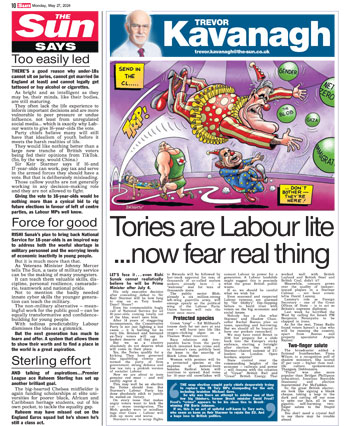
Balancing act
Way back in the day, Michael Gove was put in charge of the Times’s election coverage. I think it was probably 2001 – the foot-and-mouth, Prescott punch election. There was much preparation before the off, with likely bones of contention and key marginals identified and researched. This produced a mass of material ready to go, but Gove quite rightly declared himself willing to kill his babies should events take an unexpected turn. Several died. His staff included not just political reporters and correspondents, but also regional and specialist reporters, and – in the office – number crunchers, constituency profilers and fact checkers. There were also people who counted every column inch devoted to every party in an attempt to keep something like balance. This backroom team included graduate trainees Sam Coates, now Sky’s deputy political editor, and Sam Lister, now strategy director at the DCMS. It was all taken very seriously. Fairness, accuracy and balance were paramount. Columnists could have their say on the opinion pages, but the reporting was scrupulous. Even in the hands of a man – and under the editorship of another – whose greatest hope would have been to see the Conservatives oust Blair and co.
The Times still tries to tread an even path, but it wobbles on the tightrope rather more these days. So does the FT, wobbling to the left as the Times wobbles to the right. The i is the only other paper that attempts straight-down-the-line journalism and the one that comes closest to success. But it doesn’t have the gravitas of the broadsheets, the depth of opinion or analysis, the influence.
Openly partisan
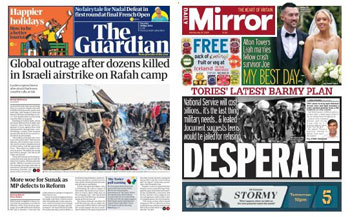
As for the rest, they are all openly, even brazenly, partisan. And the net result is an overwhelming imbalance between left and right. Not least because while the Express, Mail and Telegraph are on the case seven days a week, the Mirror and Guardian are wont to wander off and amble back only when something dramatic happens. This past week, the Guardian has been more concerned about what’s happening in Gaza than here, perhaps advisedly, and while the Mirror has splashed on politics most days, they have often been letter-box leads, dominated by giant puffs and pictures of Eamonn Holmes and Ruth Langsford.
There is a logic in that. We have six weeks of this campaign, readers want something other than politics and there are more important things in the world than the pre-manifesto phoney war soundbite ping-pong between the leaders. There are only so many times that people can bear to hear “Labour hasn’t got a plan” and “We’re a changed party” … and that quota is fast being exhausted.

The Sun is also playing it cool. Having made clear its feelings about the calling of the election at all, with its “Oh ballots!” front, featuring Harry Kane and Taylor Swift, it quickly returned to its beer / footie / celebs formula with Holmes, the Strictly Gio saga, and, yesterday, Wag War 2, pausing only to tell pensioners they’d be £2,000 a year better off under the Conservatives (more on that later). The Star is pretty much pretending it’s not happening – other than printing the pithiest leader I’ve seen all year (more on that later, too).

The Telegraph is in full-on propaganda mode. Seven out of the eight front pages since the election was announced have been what the Tories think and say, with Sunak the main picture on four of them. SamCam, Alan Titchmarsh, the Royals made up the numbers. Today’s effort capitalises on Starmer’s embarrassment over Diane Abbott, but still manages a what-Jeremy-Hunt-says-will-happen-under-Labour story downpage. This is classic Express territory (see below). It really does beggar belief that any serious newspaper should manufacture front-page news out of one man's surmise – plucked out of the air – about what another might do. But it’s happening all the time. And in the papers that accused the Remain campaign of Project Fear.
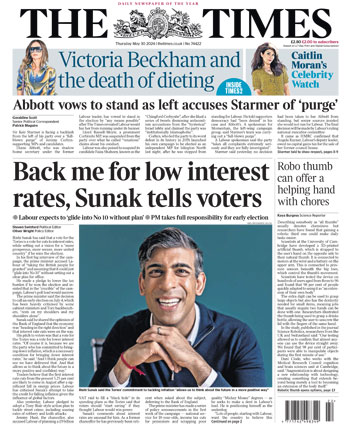
Oh, and what was I saying about the Times walking that tightrope? This morning it leads on an interview with the Prime Minister, which extends to the first election spread. This brings the Times level with the Telegraph on four main front page pictures of Sunak in just over a week, a tally the Express can only dream of. And Sir Keir Starmer? The man most likely to be running the country next month and therefore the man people most need to hear about? Well, he gave an interview to the Telegraph last week and was rewarded with a thumbnail to accompany an above-the-titlepiece puff. He planned to be in power for a decade. But this wasn’t interesting enough to lead the paper. Jeremy Hunt talking about inheritance tax was far more compelling. Still, at least Starmer got a look in. His face has yet to grace the front of the Times.
The whitetop tabloids are naturally burning up with election fever. The Express is sticking with its “Rishi says” routine, while the Mail is also playing true to form, setting itself up as the supreme authority on what the country wants and needs. On Saturday, it declared itself to be the “REAL election battleground”, on the basis that it was, for once, giving both sides a chance to put forward their cases.
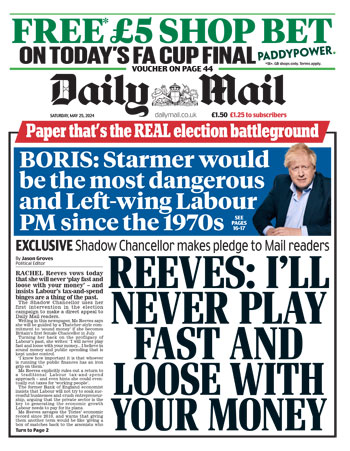
This came in the form of a “Reeves: I won’t play fast and loose with your money” splash, with a huge Boris Johnson puff looming over her at the top of the page. Well, hats off to the Mail for splashing on the story rather than the commentary. And I don’t mean that ironically. Inside, Rachel Reeves was given a page to spell out her economic philosophy, while Johnson’s column on how “dangerous” Starmer would be the most Left-wing Labour leader since the 1970s was promoted to the Saturday essay slot on the comment spread, alongside a full-drop leader urging Rishi to be bold. It was that Johnson column that prompted the Star leader next day, which I reproduce in full:
You Bozo..
Boris Johnson says Keir Starmer would be the most "dangerous" PM since the 70s.
He's forgotten someone with bad hair whose name rhymes with Doris?
The Star is not a fan.
Gunning for Labour
But back to the Mail, where devoting a splash and a page to the Shadow Chancellor proved to be the limit to its even-handedness. Other page leads included “Rayner’s plans for workers’ rights to cost £41bn” (this figure, whose workings-out were not shown, came courtesy of “Conservative analysis”) and “Now Labour could hike university fees… despite promise to scrap them”. The main election spread was given over to Michael Gove “joining the Tory exodus”.
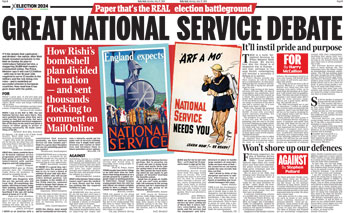
The “REAL election battleground” line was pulled out again on Monday for a spread of online readers’ views, plus “for” and “against” columns on the proposal to bring back national service. The splash and the first spread having pretty much thought it a good idea.
Since then, the paper has hailed the “triple lock plus” pension promise and the pledge to end “rip-off” degrees, while attacking Labour over VAT on school fees and votes for 16-year-olds, and sneering at the letter to the Times signed by 120 business leaders (a similar letter from influential people backing the Tories has yet to make its way to the editor – or if it has, he is suppressing it for some mysterious reason).
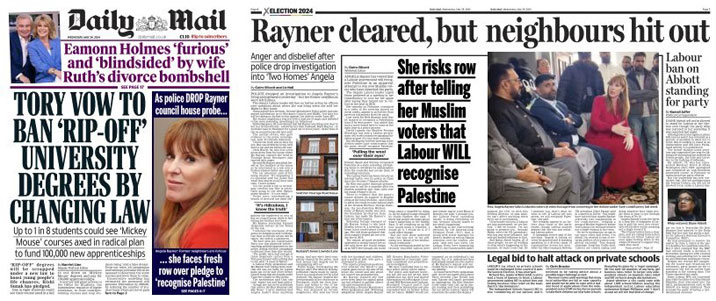
Oh yes, and Angela Rayner. After the police joined HMRC in clearing her over her old living arrangements – in spite of all the table thumping by the Mail titles and Dan Hodges – the paper turned on her yesterday over her views on a Palestinian state. It also gave a spread to her neighbours’ “fury” that the police were to take no further action. Imagine a suspect being released after questioning for murder because there was no evidence against them and a paper going back and running a spread on assorted onlookers saying, “Yeah, well, they’re all in it together. She did it. Bang to rights. It’s disgusting. I know what I know.” It was not only well out of order, it was desperate. The Mail is supposed to be the paper with its finger on the pulse of public opinion, but it has utterly failed to grasp that people just don’t care about this non-scandal over events from years before she became an MP – and haven’t from the word go. Doubling down in defeat makes it look petty and vindictive and a sore loser.
The Mail will, of course, continue to dig for dirt on Starmer, Rayner and other Labour figures. It won’t much care how low down the pecking order they come. If it can find any stick with which to beat the party it will, blowing any misdemeanour from decades ago by some minor party figure into a major scandal. Tory policies will be presented as brilliant, Labour’s will be ridiculed. The idea of setting out each party’s stall and then analysing their merits and faults in a calm, rational manner is for the birds.
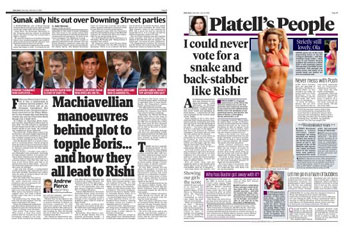
Two years ago, the paper did everything it could to prevent Rishi Sunak succeeding Boris Johnson. It portrayed him as a petulant Brutus guilty of Machiavellian plotting. Amanda Platell wrote a column declaring, “I could never vote for a snake and back-stabber like Rishi”. And it landed us with Liz Truss. Yet you can bet that as July 4 approaches, it will tell readers to stick with Rishi and that Platell will not lend her support to the LibDems. When the Tory manifesto is published, it will be celebrated, while when Labour’s comes out it will be derided. “Socialist” policies (if any survive) will be denounced and moderate ones will be written off as “you can’t trust them to deliver”.
Why pay so much attention to the Mail? Because it is our best-selling paper. Because the way it defies convention on reporting has emboldened others to follow suit. And that is the biggest sin. It spins and skews and doesn’t just present the policies and debate them calmly so that readers are well informed when they go to vote. There’s nothing wrong with partisanship. There is everything wrong with misleading people, with not telling the full story, with scaremongering, with presenting both parties’ offerings through one party’s eyes. With telling people who to admire, who to hate, what to think, without giving them the tools to think for themselves.
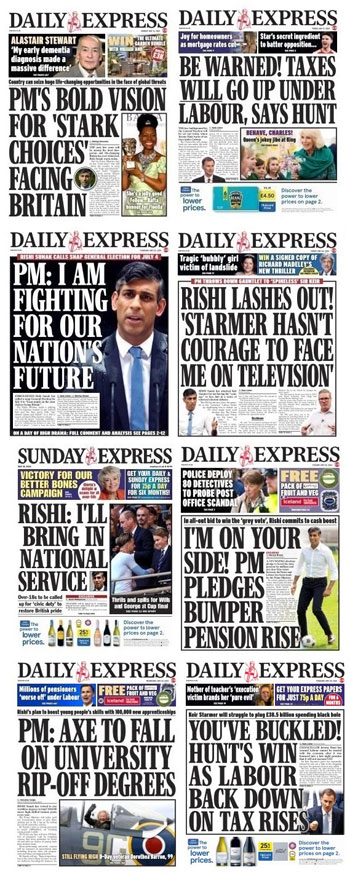
And the mini-me Express takes all that on board and does the same in a far less sophisticated way. Jeremy Hunt says Labour will raise taxes. Rishi says I’m on your side. It’s so feeble.
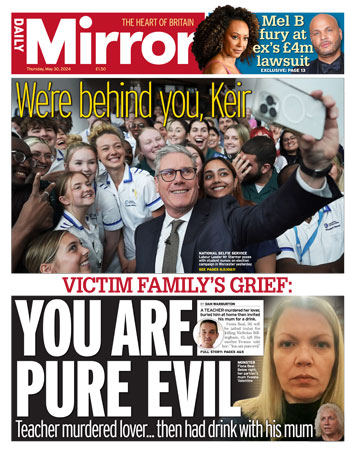
Meanwhile, the Mirror muddles up its good journalism with equally slewed “All Tories are out to kill your granny” horrors and then, often on the same page, goes off to bemoan the paroling of some killer from the last century whose crimes were committed decades before most of its readers were born. And it is no better than its rightwing rivals when it comes to burying inconvenient news. By any measure, Diane Abbott is the Labour story of the day, but the Mirror whistles “We’re behind you Keir” on a jolly picture of Starmer posing for a selfie with some student nurses. The splash is the family of a murder victim being rude about his killer. As you’d expect them to be.
Five more weeks of this. Heaven help us all.
Number crunching
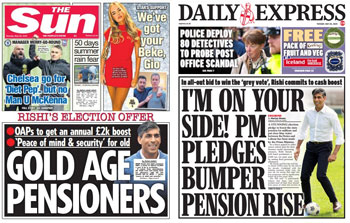
A quick word on that “triple lock plus” move to give pensioners a special tax threshold so they never have to pay tax on their state pension. The figure that stuck in my mind was £100 a year, which I thought was pretty paltry – two quid a week. The Sun presented that as £2k a year. Quite a difference. This was based on a prediction of where the triple lock formula was likely to take the state pension over the coming parliament combined with the “saving” of not having to pay tax on everything over the existing (frozen) £12,570 starting point. I do think the Sun (and, of course the Express with its “bumper pension rise”) were cheeky in projecting not having to pay something as an income boost, but that’s what successive chancellors have done, so I guess it’s par for the course.
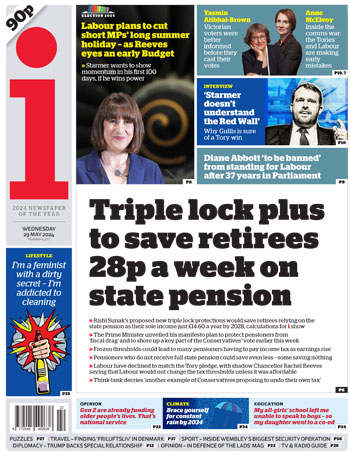
Yesterday, however, the i got an independent source to run over the figures – the investment managers AJ Bell – and came up with quite a different picture for their splash. Using OBR projections for inflation and where the state pension is likely to be over the next few years, it concluded that the “plus” bit is likely to be worth about £15 a year to someone for whom the state pension is their only income. Not quite £2k. But that’s what you find when you get someone independent to check the numbers, rather than just reproduce whatever Rishi – or Keir – says.
No pause for thought
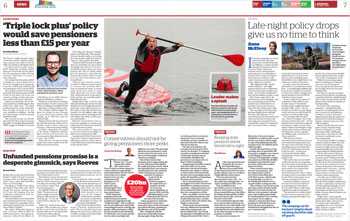
Yesterday’s i also ran an excellent column from Anne McElvoy, pointing out that we have seen a flurry of very late-night policy announcements – national service, the pensions, the clampdown on “rip-off” university courses. The 24-hour news world means politicians no longer have to time their releases to catch the first edition times or the main news bulletins and now they seem to have found a way to maximise their control over the message. Because if papers are scrambling to get these stories into print, they don’t have time to weigh them up properly. And if you are getting repeat-rifle barrages with a different target every night, there’s no time to mop up last night’s debris before rushing to the next battleground. The columnists might be able to go back and take a more considered view in the following days, but for the vast majority of readers, the moment will have passed and the soundbite will have stuck in the mind.
And so we are liable to get into the situation where papers push their favoured agendas (think Angela Rayner’s house) until they are firmly embedded in readers’ consciousness, while paying a single-day’s lip service (if that) to ideas that don’t suit – or ideas that do suit, but don’t add up on closer examination.
This is not the way to achieve an informed electorate. And an uninformed electorate cannot vote in a reliable government.
Return to Fleet Street?
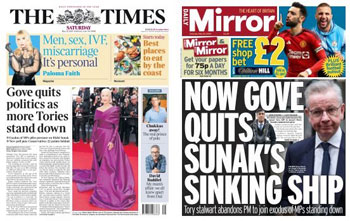
With Michael Gove joining the Westminster exodus, perhaps it’s time to think about chairs as well as seats. Who should be more worried? Penny Mordaunt, Jeremy Hunt, Jacob Rees-Mogg? Or Tony Gallagher, Ted Verity, Chris Evans?
For surely it’s a slam-dunk for Gove to take over the editorship of one of the Tory nationals. I’d have thought Gallagher the most vulnerable, given Rupert Murdoch’s great admiration for the departing MP for Surrey Heath – “one of the most impressive and significant figures of the past 50 years” – and also his identification of Gove protégé Kemi Badenoch as the “future” for the party. Gove in the Times chair would be perfectly positioned to press her case to take over from Sunak. Was that cloying “First among equals” top leader on his political legacy in Monday’s Times a pre-emptive forelock tug to the future boss?
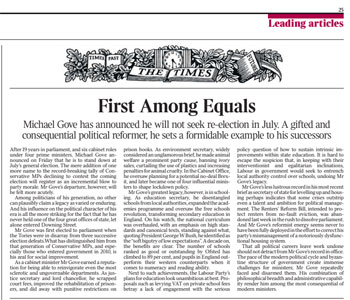
Others with a better inside track, say Lachlan is not so keen and think the Mail or Telegraph more likely. Would Gove be right-wing enough for GB News owner Paul Marshall should he succeed in securing the Telegraph? Possibly not, but he has shown chameleon-like ability to adopt a variety of colours. Would there be an awkwardness at the Mail, where his ex-wife Sarah Vine is an immovable fixture? Possibly, but they are reported to have a cordial relationship.
Maybe it’s all fantasy team shuffling, but the editorship of any one of the three titles would give Gove the far greater influence on national affairs than the lecture circuit, business or even the Lords could offer. With hindsight, it’s clear that the opposition front bench was never going to be a runner.
Gratuitous speculation
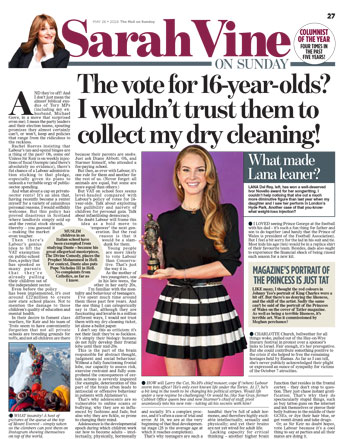
Speaking of Sarah Vine, while her views on votes for 16-year-olds and VAT on private school fees were much as expected (both Labour policies, both bad), I was struck by the photograph of Lana del Rey clutching her Ivor Novello award in the middle of Vine’s Sunday column. Or rather by the headline: “What made Lana leaner?”
The text was even more alarming: “I couldn't help noticing,” she wrote, “that she cut a much more diminutive figure than last year when my daughter and I saw her perform in London's Hyde Park. Another case of that you-know-what weight-loss injection?”
Was this supposed to be a cool “I’m a mum who goes to gigs with my daughter” moment? If so, it was feeble. But that wasn’t the alarming bit. What, in this day and age, is any columnist – male or female – doing making gratuitous remarks about anyone’s figure – and speculating with neither reason nor knowledge on how, if it had indeed changed, the transformation had come about?
Too much Taylor?
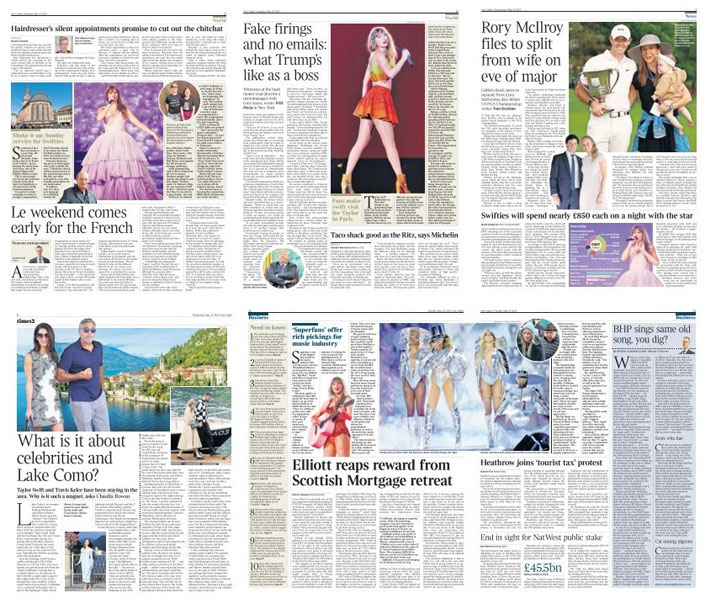
Sticking with popular young female singers, Tony Gallagher had some words to say about the reigning queen at a media futures event last month: “I used to work for an organisation where the editor every second Sunday used a picture of the actress / swimsuit model Liz Hurley because he thought young people really wanted to see Liz Hurley. It epitomised what I think is wrong with going after that kind of audience – thinking that’s what young people want to look for.
“At The Times, we hope they’ll come to us and we are making efforts to reach them but we can’t do that by having pictures of Taylor Swift everywhere.”
Sounds sensible. Perhaps he should let his staff into the secret. Over the past two weeks, Swift has made passing appearances in more than 20 stories and taken a bigger role in nine. She has been in Caitlin Moran’s Celebrity Watch (fair enough), on the travel pages, in sport, at Lake Como in a T2 feature, on the business pages in a piece about the growing influence of “superfans”, in the diary and on both home and overseas news pages. Her photograph was used to illustrate eight of them.
Non-exclusive exclusives
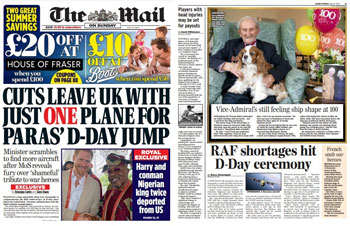
Time for another look at what constitutes an exclusive. A couple of weeks back, the Mail on Sunday had an exclusive on there being only one plane available for a D-Day parachute jump. A story that also appeared in the Sunday Express, albeit with rather more low-key presentation. Another followed with Rishi Sunak’s announcement that he plans to bring back national service. This exclusive was also covered by the Telegraph, Express, Sun, Times and Observer – by every Sunday title, in fact. To be fair, in this instance, the “exclusive” element was the fact that Sunak had provided a bylined piece about his daughters wanting to do their bit. Similarly, every tabloid has had “exclusives” almost every day for a week on the break up of Eamonn Holmes’s marriage. Essentially the same story with a single different nugget to justify the tag. One paper’s got his side of the story, another has hers, then there are the relatives and so-called friends pitching in. The wholesale raking over the embers of this marriage is intrusive, distasteful and, with or without the “exclusive” label, ridiculously overblown.
Podcast plug masquerading as news
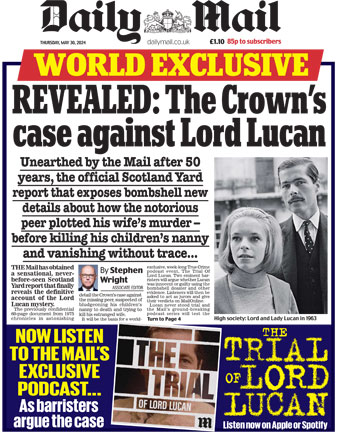
What was I saying about the Mirror and ancient crimes? It’s not the only paper with this strange obsession. The Mail finds it very hard to let go of Lord Lucan, who disappeared 50 years ago after his children’s nanny was found murdered. Today, it has a “world exclusive” on the crown’s evidence against him, should he have ever faced trial. Well, it makes a change from the election, but how many readers really care? The answer is, the paper isn’t bothered. What it wants to do is push its true crime podcast, for which there is a huge puff at the foot of the page.
And it makes no bones about it. The text makes clear that the entire story is vehicle for self-promotion: The Scotland Yard report it has unearthed “will be the basis for a world-exclusive, week-long True Crime podcast event, The Trial Of Lord Lucan. Two eminent barristers will argue whether Lucan was innocent or guilty using the bombshell dossier and other evidence. Listeners will then be asked to act as jurors and give their verdicts on MailOnline. Lucan never stood trial and the Mail’s ground-breaking podcast series will test the evidence in the Crown’s case against him.”
In case you find that hard to believe, let me say it again. Those are the third and fourth paragraphs of the story the Mail believes is the most important thing for readers to see today.
Blood scandal
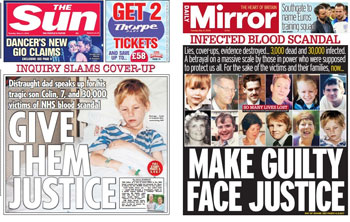
Finally, I know it seems ages ago, but a quick word on the contaminated blood scandal. Most titles did a good job. Sunak’s description of it as a national “day of shame” was right. It was a good soundbite that unsurprisingly made a lot of splash headlines. But this wasn’t about Rishi and what he thought or said. It was about the victims. Both the Sun and Mirror front pages therefore stood out, showing the rest how it should be done.
But where was all the coverage over the years? The media weren’t as behind the curve as on the sub-postmasters, but scandal after scandal brings after-the-event hand-wringing and it-must-never-happen-againery. Harry Evans’s thalidomide investigation and campaign remains one of the golden achievements of journalism. That was more than half a century ago. The scandals keep coming, but where are the dogged journalists to uncover and pursue them?
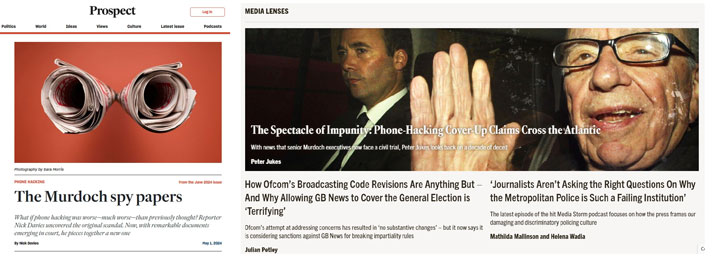
Nick Davies is still on the hacking trail, now for Prospect magazine. Byline Times, also pursuing Murdoch, is growing. Clearly the “high street” papers aren’t going to go down that road. But there are other matters of public interest where Private Eye shows determination (not least its record on the postmasters). Where are the big titles on these stories? They claim to be looking out for their readers, to be great campaigners, but they aren’t. They’re businesses. There is more to our trade than clickbait.
Front page of the fortnight
For journalism, as mentioned above, yesterday’s i; for impact, this from the Mirror.
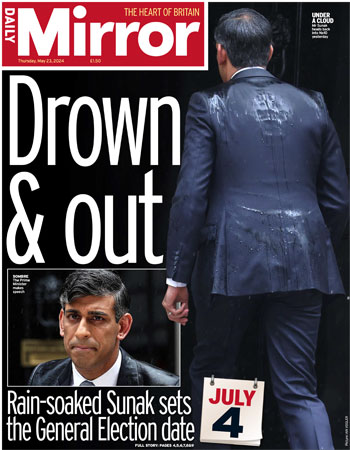
And for fun, this from the Star is hard to better.
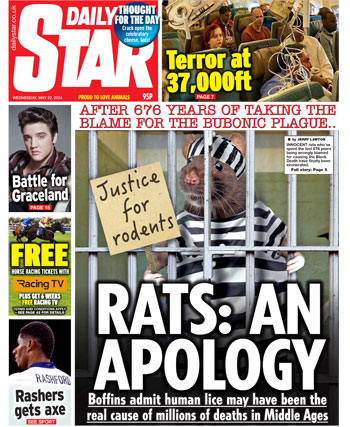
Liz Gerard’s Notebook is a fortnightly column published in the InPubWeekly newsletter. To be added to the mailing list, enter your email address here.












